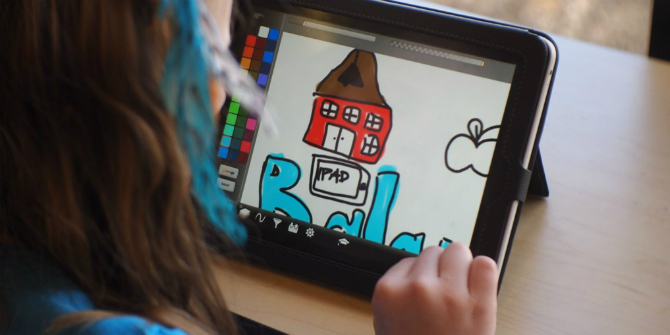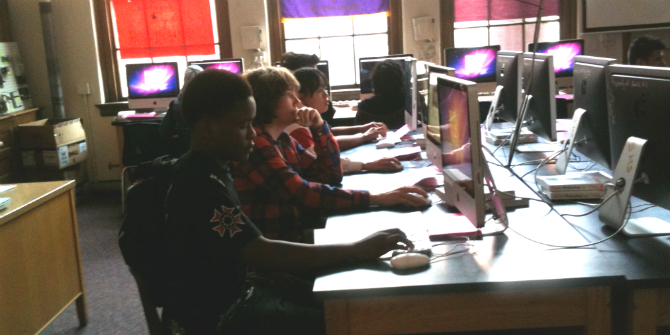 Angharad Rudkin, child clinical psychologist at the University of Southampton, examines the challenges facing parents in how to determine what degree of screen time is harmful or beneficial for their children. Her piece follows a special workshop¹ convened by the Media Policy Project and Parenting for a Digital Future on ‘Families and “screen-time”: challenges of media self-regulation’ and the publication of a new policy brief about families and “screen time”, authored by Alicia Blum-Ross and Sonia Livingstone. [Header image credit: B. Flickinger, CC BY 2.0]
Angharad Rudkin, child clinical psychologist at the University of Southampton, examines the challenges facing parents in how to determine what degree of screen time is harmful or beneficial for their children. Her piece follows a special workshop¹ convened by the Media Policy Project and Parenting for a Digital Future on ‘Families and “screen-time”: challenges of media self-regulation’ and the publication of a new policy brief about families and “screen time”, authored by Alicia Blum-Ross and Sonia Livingstone. [Header image credit: B. Flickinger, CC BY 2.0]
It is stating the obvious I know, but screen time is a big issue for parents right now. Norms are being pushed almost daily – what was deemed outrageous a while ago, (e.g. a toddler on mum’s iPhone while they were pushed around Ikea. Ikea? A pretty stimulating shop for kids!) is now considered normal. While we are swept up on this wave of rather guilt-ridden but nonetheless common parenting practice (parents know that it may not be in the best interest of their child to be put in front of a screen, but the convenience of immediate entertainment can be too hard to resist for the busy parent), we haven’t time to stand back from the wave and consider the impact of this screen time. We know that physical issues such as obesity and sleep difficulties are linked with screen time. But we don’t know what the consequence of this screen time is on how children think about themselves and others, nor do we know what impact it has on their emotional development.
I was lucky to be part of a workshop held by the LSE Media Policy Project. Before this meeting, I carried out a quick scope of current research in the psychological literature related to screen time. This search revealed a number of studies looking at many different aspects of screen time. For example, that early adolescents (ages 11–14) are at an increased risk for perpetrating cyber aggression when compared to children, older adolescents, and young adults. Or, that anger in adolescents rejected by peers was linked to higher tolerance of antisocial media content. Slowly, over time and with methodological rigour, a clearer picture may emerge.
Many issues were raised during the discussion. Two issues that were touched on are the concepts of boredom and mindfulness, and how they relate to screen time in young people. These two concepts may look similar but actually serve quite different functions. Boredom is a lack of something, a lack of stimulation. But, boredom leads to greater creativity. By having that empty space, our brains actually work harder to create solutions and entertainment. Mindfulness has been linked to well-being in children and adults. It is about paying attention to the present, slowing life down for a moment. What happens to both of these experiences – boredom and mindfulness – when young people can be entertained by a screen continuously?
Did we come up with an answer during the workshop to the question of how much screen time children should have? No. Though some parents would greatly appreciate a simple, headline grabbing prescription (as they have with other areas of parenting such as eating), I don’t think it’s possible right now. Screen time means different things to different people at different times. For example, Skype or FaceTime with a grandparent who lives in a different country can enrich a child’s life, while spending two hours on a violent computer game, can feel isolating. Children’s experience of screen time will depend on how good they feel about themselves that day and how they feel loved and emotionally contained by their parents. How can we quantify good versus bad screen time? It is the context that counts.
Screen time is relational, it occurs within the complex dynamics of relationships – with family, friends and with strangers half-way across the world playing the same game. What may be healthy, happiness-boosting screen time one day can be harmful the next day because of a vicious comment posted online, or a sense of not being as good as the person you’re watching on YouTube. As was discussed in the workshop, we can’t offer a prescription because we don’t know what the illness is. Indeed, we don’t even know if there is an illness. We don’t want to be guilty of perpetuating the “scientific pile-on effect”, where once something is seen to be unhealthy there is an increase in studies linking this unhealthy thing to poor outcomes (e.g. drinking fizzy pop). Any guidance needs to be based on solid evidence base rather than a fear of change. We need good quality research that looks in detail at different aspects of child development and their relation to screen time.
I think the next step is to empower parents. Teach them how to identify when screen time is becoming problematic for their child (meaning that is interfering with normal development and functioning) and give them the confidence to manage it.
NOTES
¹ A summary of the related event on families and ‘screen time’ has been published by the Media Policy Project and Parenting for a Digital Future, and is available to read here.
This text was originally published on the Media Policy Project blog and has been re-posted with permission.






